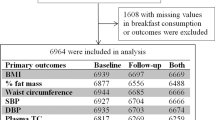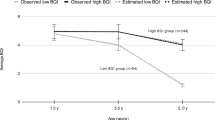Abstract
Background/objectives
The longitudinal association between skipping breakfast in parents and their children, and the subsequent risk of childhood overweight/obesity is unknown, especially in children under 10 years of age. We therefore aimed to prospectively assess the association between parents who skip their breakfast and the risk of children skipping their breakfast, as well as the risk of childhood overweight/obesity in children who skip their breakfast, using a10.5-year follow-up data on nationality representative samples.
Methods
A total of 43, 663 children aged 1.5 years in 2002 were followed until 12 years of age. An overweight body mass index (BMI), including obesity, was defined as a BMI greater than or equal to 25 kg/m2, according to the International Obesity Task Force cut-off points for children. Associations between parents, when children were 1.5 years of age, and children (2.5–12 years of age) skipping breakfast, as well as childhood overweight/obesity were calculated using logistic regression models.
Results
Of the 42 663 children included, 12 and 32% of their mothers and fathers usually skipped breakfast when the child was 1.5 years of age, respectively. Children whose mothers or fathers skipped breakfast were more likely to skip breakfast, than those whose parents ate breakfast for all ages: the range of multivariable odds ratios (ORs) was 1.90 (95% confidence interval (CI) 1.56-2.31) to 2.98 (95% CI 2.28-3.90) among mothers and 1.42 (95% CI 1.33-1.51) to 2.43 (95% CI 1.90-3.11) among fathers. When both parents skipped breakfast, the strongest association was observed. Compared to children who did not skip breakfast, children who skipped breakfast had 18–116% increased risk of overweight/obesity; the multivariable ORs were 1.18 (95% CI 1.05-1.32) and 2.16 (95% CI 1.55-2.99), respectively.
Conclusions
There was a significant association between skipping breakfast in parents and children. Children who skipped breakfast had significantly increased risk of childhood overweight/obesity.
This is a preview of subscription content, access via your institution
Access options
Subscribe to this journal
Receive 12 print issues and online access
$259.00 per year
only $21.58 per issue
Buy this article
- Purchase on Springer Link
- Instant access to full article PDF
Prices may be subject to local taxes which are calculated during checkout



Similar content being viewed by others
References
Shirasawa T, Shimada N, Ochiai H, Ohtsu T, Hoshino H, Nishimura R, et al. High blood pressure in obese and nonobese Japanese children: blood pressure measurement is necessary even in nonobese Japanese children. J Epidemiol. 2010;20:408–12.
Jones Nielsen JD, Laverty AA, Millett C, Mainous AG, Majeed A, Saxena S. Rising obesity-related hospital admissions among children and young people in England: national time trends study. PLoS One. 2013;8:e65764.
Lobstein T, Baur L, Uauy R. IASO International Obesity TaskForce. Obesity in children and young people: a crisis in public health. Obes Rev. 2004;5:4–104. Suppl 1
Matsushita Y, Yoshiike N, Kaneda F, Yoshita K, Takimoto H. Trends in childhood obesity in Japan over the last 25 years from the National Nutrition Survey. Obes Res. 2004;12:205–14.
Wang Y, Lobstein T. Worldwide trends in childhood overweight and obesity. Int J Pediatr Obes. 2006;1:11–25.
Ng M, Fleming T, Robinson M, Thomson B, Graetz N, Margono C, et al. Global, regional, and national prevalence of overweight and obesity in children and adults during 1980-2013: a systematic analysis for the Global Burden of Disease Study 2013. Lancet. 2014;384:766–81.
The GBD 2015 Obesity Collaborators. Health effects of overweight and obesity in 195 countries over 25 Years. N Engl J Med. 2017;377:13–27.
Evensen E, Wilsgaard T, Furberg AS, Skeie G. Tracking of overweight and obesity from early childhood to adolescence in a population-based cohort—the Tromsø Study, Fit Futures. BMC Pediatr. 2016;16:64.
Singh AS, Mulder C, Twisk JW, van Mechelen W, Chinapaw MJ. Tracking of childhood overweight into adulthood: a systematic review of the literature. Obes Rev. 2008;9:474–88.
Kotani K, Nishida M, Yamashita S, Funahashi T, Fujioka S, Tokunaga K, et al. Two decades of annual medical examinations in Japanese obese children: do obese children grow into obese adults? Int J Obes Relat Metab Disord. 1997;21:912–21.
Reilly JJ, Kelly J. Long-term impact of overweight and obesity in childhood and adolescence on morbidity and premature mortality in adulthood: systematic review. Int J Obes. 2011;35:891–8.
Power C, Lake JK, Cole TJ. Measurement and long-term health risks of child and adolescent fatness. Int J Obes. 1997;21:507–26.
Maffeis C, Tato L. Long-term effects of childhood obesity on morbidity and mortality. Horm Res. 2001;55:42–45.
Hanley B, Dijane J, Fewtrell M, Grynberg A, Hummel S, Junien C, et al. Metabolic imprinting, programming and epigenetics—a review of present priorities and future opportunities. Br J Nutr. 2010;104:S1–S25.
Haines PS, Guilkey DK, Popkin BM. Trends in breakfast consumption of US adults between 1965 and 1991. J Am Diet Assoc. 1996;96:464–70.
Alexy U, Wicher M, Kersting M. Breakfast trends in children and adolescents: frequency and quality. Public Health Nutr. 2010;13:1795–802.
Lazzeri G, Ahluwalia N, Niclasen B, Pammolli A, Vereecken C, Rasmussen M, et al. Trends from 2002 to 2010 in daily breakfast consumption and its socio-demographic correlates in adolescents across 31 countries participating in the HBSC Study. PLoS One. 2016;11:e0151052.
Ministry of Health, Labour and Welfare. Annual Report of the National Health and Nutrition Survey in Japan, 2013; available at: http://www.mhlw.go.jp/bunya/kenkou/eiyou/dl/h23-houkoku.pdf (in Japanese) Accessed 11 Sep 2017.
Keski-Rahkonen A, Kaprio J, Rissanen A, Virkkunen M, Rose RJ. Breakfast skipping and health-compromising behaviors in adolescents and adults. Eur J Clin Nutr. 2003;57:842–53.
Vik FN, Te Velde SJ, Van Lippevelde W, Manios Y, Kovacs E, Jan N, et al. Regular family breakfast was associated with children’s overweight and parental education: results from the ENERGY cross-sectional study. Prev Med. 2016;91:197–203.
Thompson-McCormick JJ, Thomas JJ, Bainivualiku A, Khan AN, Becker AE. Breakfast skipping as a risk correlate of overweight and obesity in school-going ethnic Fijian adolescent girls. Asia Pac J Clin Nutr. 2010;19:372–82.
Tin SPP, Ho SY, Mak KH, Wan KL, Lam TH. Breakfast skipping and change in body mass index in young children. Int J Obes. 2011;35:899–906.
Kupers LK, de Pijper JJ, Sauer PJJ, Stolk RP, Corpeleijn E. Skipping breakfast and overweight in 2-and 5-year-old Dutch children-the GECKO Drenthe cohort. Int J Obes. 2014;38:569–71.
Cole TJ, Bellizzi MC, Flegal KM, Dietz WH. Establishing a standard definition for child overweight and obesity worldwide: international survey. BMJ. 2000;320:1240–3.
Patro-Golab B, Zalewski BM, Kolodziej M, Kouwenhoven S, Poston L, Godfrey KM, et al. Nutritional interventions or exposures in infants and children aged up to 3 years and their effects on subsequent risk of overweight, obesity and body fat: a systematic review of systematic reviews. Obes Rev. 2016;17:1245–57.
Jwa SC, Fujiwara T, Kondo N. Latent protective effects of breastfeeding on late childhood overweight and obesity: a nationwide prospective study. Obesity. 2014;22:1527–37.
Gaina A, Sekine M, Chandola T, Marmot M, Kagamimori S. Mother employment status and nutritional patterns in Japanese junior high schoolchildren. Int J Obes. 2009;33:753–7.
Manios Y, Moschonis G, Androutsos O, Filippou C, Van Lippevelde W, Vik FN, et al. Family sociodemographic characteristics as correlates of children’s breakfast habits and weight status in eight European countries. The ENERGY (EuropeaN Energy balance Research to prevent excessive weight Gain among Youth) project. Public Health Nutr. 2015;18:774–83.
van Kleef E, Vingerhoeds MH, Vrijhof M, van Trijp HC. Breakfast barriers and opportunities for children living in a Dutch disadvantaged neighbourhood. Appetite. 2016;107:372–82.
de Onis M, Onyango AW, Borghi E, Siyam A, Nishida C, Siekmann J. Development of a WHO growth reference for school-aged children and adolescents. Bull World Health Organ. 2007;85:660–7.
Styne DM, Arslanian SA, Connor EL, Farooqi IS, Murad MH, Silverstein JH, et al. Pediatric obesity-assessment, treatment, and prevention: an Endocrine Society Clinical Practice Guideline. J Clin Endocrinol Metab. 2017;102:709–57.
Nagahara Keiko DK, Takahashi Kenichiro, Itabashi Kazuo. Comparison of BMI-for-age percentile with weight-for-height in school-age children: analysis of the Japanese school health examination survey 2000. J Showa Med Assoc. 2011;71:625–31. [in Japanese, English abstract]
WHO Expert Consultation. Appropriate body-mass index for Asian populations and its implications for policy and intervention strategies. Lancet. 2004;363:157–63.
Nas A, Mirza N, Hagele F, Kahlhofer J, Keller J, Rising R, et al. Impact of breakfast skipping compared with dinner skipping on regulation of energy balance and metabolic risk. Ame J Clin Nutr. 2017;105:1351–61.
Locke AE, Kahali B, Berndt SI, Justice AE, Pers TH, Day FR, et al. Genetic studies of body mass index yield new insights for obesity biology. Nature. 2015;518:197–206.
Deshmukh-Taskar P, Nicklas TA, Radcliffe JD, O’Neil CE, Liu Y. The relationship of breakfast skipping and type of breakfast consumed with overweight/obesity, abdominal obesity, other cardiometabolic risk factors and the metabolic syndrome in young adults. The National Health and Nutrition Examination Survey (NHANES): 1999-2006. Public Health Nutr. 2013;16:2073–82.
Huang CJ, Hu HT, Fan YC, Liao YM, Tsai PS. Associations of breakfast skipping with obesity and health-related quality of life: evidence from a national survey in Taiwan. Int J Obes. 2010;34:720–5.
Croezen S, Visscher TL, Ter Bogt NC, Veling ML, Haveman-Nies A. Skipping breakfast, alcohol consumption and physical inactivity as risk factors for overweight and obesity in adolescents: results of the E-MOVO project. Eur J Clin Nutr. 2009;63:405–12.
Funding
This work was supported by Japan Society for the Promotion of Science (JSPS) KAKENHI Grants (15K19256). The funding sources had no role in the design and conduct of the study; in the analysis and interpretation of the data; or in the preparation, review, or approval of the final manuscript.
Author contributions
The authors’ responsibilities were as follows: CO devised the study hypothesis; CO and TT analyzed the data; CO wrote the first draft; TT and HI made critical revisions. All authors were involved in interpretation of the result and revision of the manuscript and approved the final version of the manuscript.
Author information
Authors and Affiliations
Corresponding author
Ethics declarations
Conflict of interest
The authors declare that they have no conflict of interest.
Electronic supplementary material
Rights and permissions
About this article
Cite this article
Okada, C., Tabuchi, T. & Iso, H. Association between skipping breakfast in parents and children and childhood overweight/obesity among children: a nationwide 10.5-year prospective study in Japan. Int J Obes 42, 1724–1732 (2018). https://doi.org/10.1038/s41366-018-0066-5
Received:
Revised:
Accepted:
Published:
Issue Date:
DOI: https://doi.org/10.1038/s41366-018-0066-5
This article is cited by
-
Health literacy and effects on household/family dietary behaviour: a systematic scoping review
Journal of Public Health (2023)
-
The impact of summer vacation on children’s obesogenic behaviors and body mass index: a natural experiment
International Journal of Behavioral Nutrition and Physical Activity (2020)
-
Obesity epidemic in urban Tanzania: a public health calamity in an already overwhelmed and fragmented health system
BMC Endocrine Disorders (2020)
-
Risk Factors for Overweight and Obesity in Children Attending the First Year of Primary Schools in Modena, Italy
Journal of Community Health (2020)



